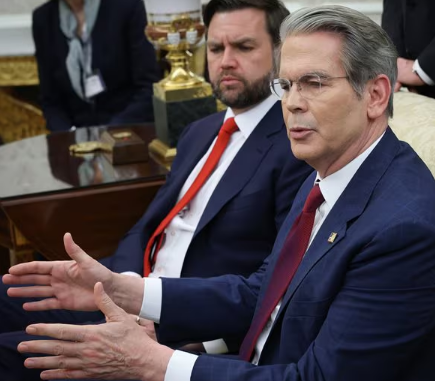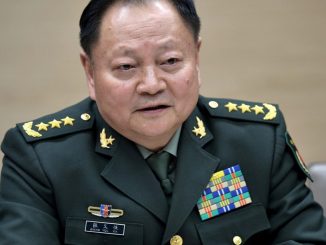
U.S. Treasury Secretary Scott Bessent speaks about a minerals agreement with Ukraine as Vice President JD Vance, left, listens in the Oval Office at the White House on April 17, 2025 in Washington, D.C. (Win McNamee/Getty Images)
| Published April 23, 2025
In a recent address, U.S. Treasury Secretary Scott Bessent indicated that the ongoing tariff standoff between the United States and China is unsustainable and anticipates a “de-escalation” in the trade war between the two economic giants. Speaking privately to JPMorgan Chase executives, Bessent acknowledged that formal negotiations have yet to commence, despite the high tariffs currently in place—145% on Chinese imports and 125% on U.S. goods.
Bessent emphasized that both nations recognize the untenable nature of the current trade dynamics, stating, “Neither side thinks the status quo is sustainable.” His remarks suggest a mutual understanding of the need to resolve the escalating economic tensions.
The financial markets responded positively to Bessent’s comments, with the S&P 500 index experiencing gains following reports of his speech. This optimism reflects investor hope for a resolution to the trade dispute that has contributed to market volatility.
While the Trump administration has engaged in trade discussions with several countries, including Japan, India, South Korea, the European Union, Canada, and Mexico, there has been no public indication of a rollback on the baseline 10% tariff. President Trump has maintained that he seeks reciprocal trade agreements and the removal of non-tariff barriers that hinder U.S. exports.
White House Press Secretary Karoline Leavitt reported that the administration has received 18 proposals from other nations for trade deals, signaling a global interest in negotiating with the U.S. However, China’s Commerce Ministry has cautioned against agreements that could compromise China’s interests, underscoring the complexity of the international trade landscape.
As the situation evolves, Secretary Bessent’s insights suggest a potential shift towards more constructive dialogue between the U.S. and China, aiming to alleviate the economic strain caused by the protracted trade conflict.
SOURCES: NEWSMAX – Bessent Expects China Tariff Standoff to Deescalate
FRANCE 24 – US Treasury chief expects China tariff impasse to de-escalate
REUTERS – US Treasury Secretary says situation with China is unsustainable, source says





Be the first to comment